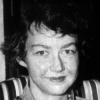Flannery O'Connor

Flannery O'Connor
Mary Flannery O'Connorwas an American writer and essayist. An important voice in American literature, she wrote two novels and 32 short stories, as well as a number of reviews and commentaries. She was a Southern writer who often wrote in a Southern Gothic style and relied heavily on regional settings and grotesque characters. Her writing also reflected her own Roman Catholic faith and frequently examined questions of morality and ethics. Her posthumously-compiled Complete Stories won the 1972 U.S. National Book...
NationalityAmerican
ProfessionNovelist
Date of Birth25 March 1925
CitySavannah, GA
CountryUnited States of America
I find that most people know what a story is until they sit down to write one.
I am not afraid that the book will be controversial, I'm afraid it will not be controversial.
The writer operates at a peculiar crossroads where time and place and eternity somehow meet. His problem is to find that location.
Dogma is the guardian of mystery. The doctrines are spiritually significant in ways that we cannot fathom.
St. Cyril of Jerusalem, in instructing catechumens, wrote: “The dragon sits by the side of the road, watching those who pass. Beware lest he devour you. We go to the Father of Souls, but it is necessary to pass by the dragon.” No matter what form the dragon may take, it is of this mysterious passage past him, or into his jaws, that stories of any depth will always be concerned to tell, and this being the case, it requires considerable courage at any time, in any country, not to turn away from the storyteller.
Your beliefs will be the light by which you see, but they will not be what you see and they will not be a substitute for seeing.
I'm a member and preacher to that church where the blind don't see and the lame don't walk and what's dead stays that way.
You don't serve God by saying: the Church is ineffective, I'll have none of it. Your pain at its lack of effectiveness is a sign of your nearness to God. We help overcome this lack of effectiveness simply by suffering on account of it.
The writer should never be ashamed of staring. There is nothing that does not require his attention.
The writer can choose what he writes about but he cannot choose what he is able to make live.
I distrust pious phrases, especially when they issue from my mouth. I try militantly never to be affected by the pious language of the faithful but it is always coming out when you least expect it. In contrast to the pious language of the faithful, the liturgy is beautifully flat.
I have almost no capacity for worship. What I have is the knowledge that it is my duty to worship and worship only what I believe to be true.” May 19, 1962
Faith is what someone knows to be true, whether they believe it or not.
You know," Daddy said, "it's some that can live their whole life out without asking about it and it's others has to know why it is, and this boy is one of the latters. He's going to be into everything!